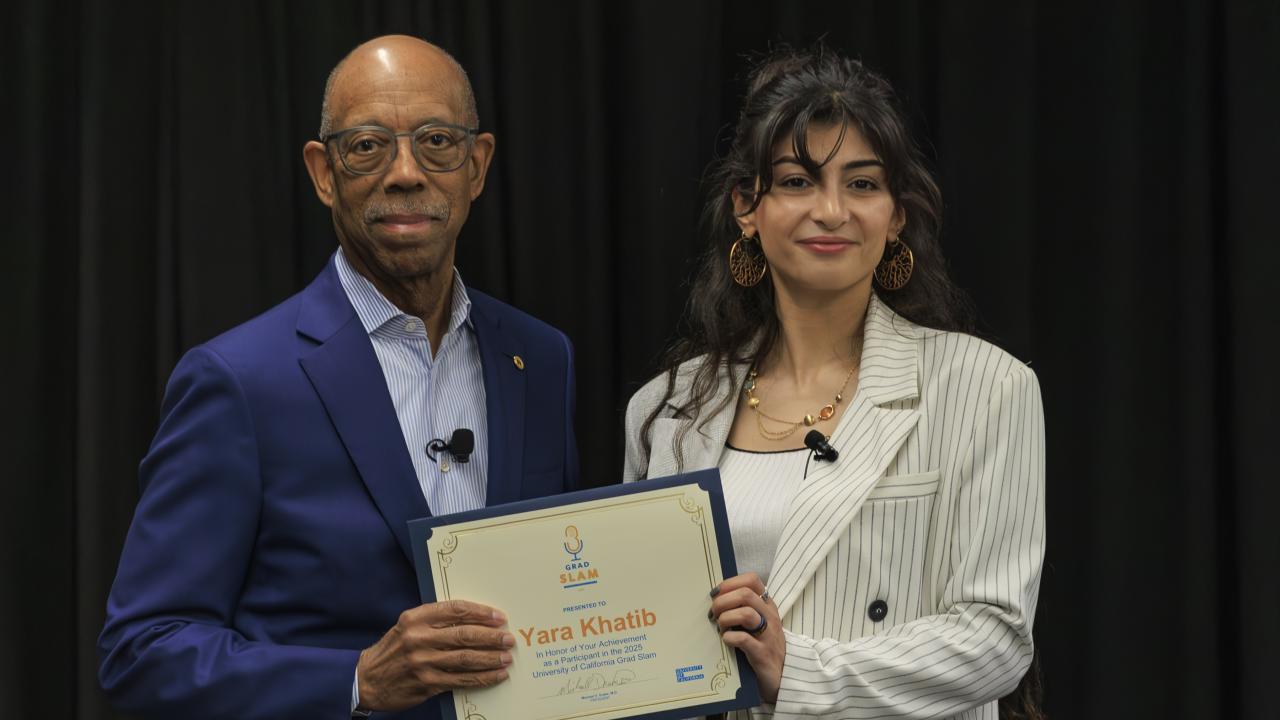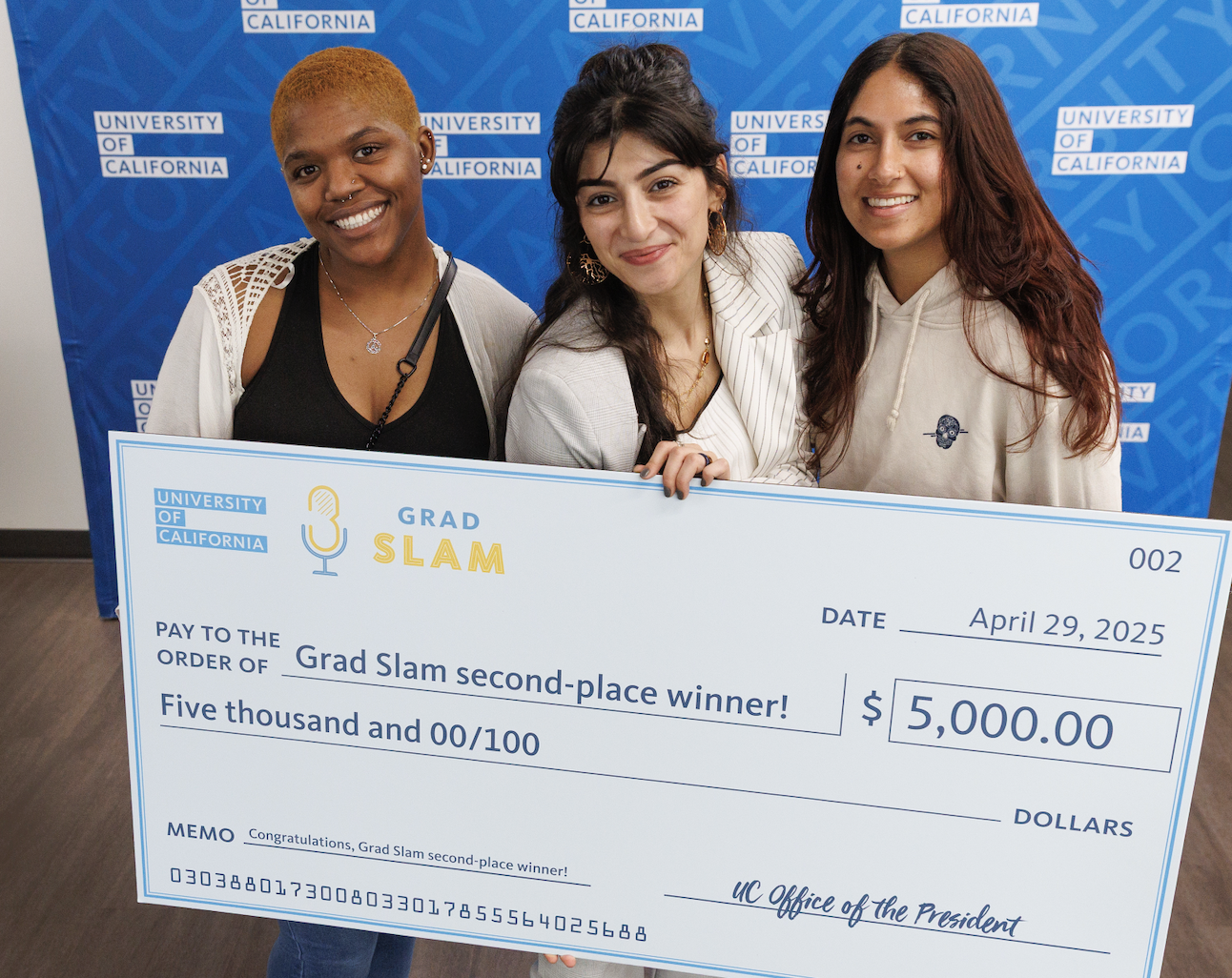
UC Davis Graduate Student Wins 2nd Place in UC Grad Slam
Yara Khatib wins UC award for explaining the impact of psychedelic-like drugs on mental health in three-minutes or less
Yara Khatib, a fourth-year Ph.D. candidate in the Pharmacology and Toxicology Graduate Group, won second place in the UC Grad Slam competition held on April 29 at the UC Student and Policy Center in Sacramento. This is the first year the University of California hosted its systemwide competition in the state’s capital after moving it from the LinkedIn Center in San Francisco. Khatib competed against nine other graduate students representing each of the other universities in the University of California system.
“It was a really fun experience,” she said. “I went into it with a calm, spontaneous mindset — I just wanted to try something new and put myself out there. I didn’t expect much, but I ended up making it to the semifinals, and then suddenly, I was in the finals.”
Khatib is only the third person from UC Davis to earn a UC Grad Slam award since the UC-wide competition that focuses on promoting graduate student research began in 2015. Former UC Davis graduate student Julia Mouat won second place in the 2023 UC Grad Slam competition, and Katie Murphy won first place in the 2019 UC Grad Slam competition.
“We are incredibly proud of Yara for her success” said Jean-Pierre Delplanque, vice provost and dean of Graduate Studies. “Her work exemplifies the very best of the Grad Slam competition — scholarly communication that is thoughtfully accessible, deeply creative and rich with intellectual depth. It’s inspiring to see such complex ideas presented in a way that connects with diverse audiences and drives meaningful impact.”
UC Grad Slam is an annual contest in which master’s and Ph.D. students across UC campuses — in disciplines ranging from hard sciences to humanities — compete to sum up their research for a general audience. Students present the significance and fundamental points of their work at UC Davis in a clear, direct, and interesting manner.
“The Road to Recovery”
With just one slide and talking for less than three-minutes, Khatib explained to a lay audience her complex research into how different drugs affect the structure of brain cells, an interest that began when she was an undergraduate.
"I studied Pharmacology and Molecular Genetics at King’s College London, then went on to earn my Master’s in Pharmacology at Georgetown University — an experience that sparked my passion for understanding and treating mental health conditions," said Khatib. "Now, I’m a fourth-year Ph.D. candidate in the Olson Lab [at the UC Davis Institute for Psychedelics and Neurotherapeutics], studying how different drugs affect the structure of brain cells."
In her presentation “The Road to Recovery: Psychedelic-like drugs for Improving Mental Health,” Khatib shared how psychedelic-like drugs can treat key aspects of the structural breakdowns and connections that neurological disorders can cause rather than simply managing the symptoms with unwanted side effects. Khatib and the Olson Lab have found that the restorative qualities of psychedelics can be teased apart from the hallucinogenic side effects to create new psychedelic-like drugs that harness these restorative qualities.
Science communication takes center stage
Khatib decided to enter the 2025 UC Grad Slam competition because of her affinity for science communication.
“Science communication has always been something I love and naturally gravitate toward, so I approached the competition with a sense of ease and excitement rather than pressure,” she said.
Khatib credits her low-stakes approach to her success. She said she focused on enjoying the process instead of over-thinking it, which allowed her to home in on the most interesting and accessible way to convey her research.
“The ‘aha’ moment came when I landed on the metaphor of the brain as a city,” she said. “I’d been thinking a lot about how to describe these complex neural networks, and in my mind, I kept picturing infrastructure — roads, bridges, highways — all working together to keep things running smoothly. Then I imagined what happens when parts of that system start to break down. I ran the idea by a few lab mates, and then I went home and wrote the whole pitch. It came together pretty organically from there.”

Prepping for and participating in Grad Slam
To prepare for the competition, Khatib leaned on the “really collaborative environment” of her lab. She practiced her talk in front of her lab mates and used their feedback to refine her presentation and messaging.
Khatib said she has thoroughly enjoyed the whole UC Grad Slam experience — including both the UC Davis semi-final round and the UC competition. But as a platform for showcasing the diversity of research across the UC, she argues that it’s more than a competition.
“Grad Slam is a chance to connect, network, and amplify the value of graduate research,” she said. “This year in particular it also served as a space for important conversations about the future of scientific funding, especially in light of federal cuts.”
Khatib received $10,000 total acknowledging her skill and effort: a $5,000 check for winning the UC Davis competition and a $5,000 check for winning second place in the UC competition. When asked about what advice she would give for others interested in the Grad Slam competition, Khatib said to “Just go for it.”
“Imagine explaining your research to someone who has no background in your field and think about how you’d make it click for them,” she said. “That’s the goal. And most importantly, have fun with it!”
